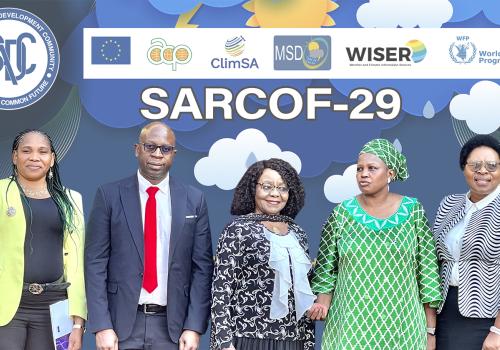The Southern African Development Community (SADC) convened the 29th Southern Africa Climate Outlook Forum (SARCOF) in Harare, Zimbabwe from 26th - 28th August 2024. The forum was attended by Climate Experts, including Permanent Representatives from SADC Member States with the World Meteorological Organisation (WMO), climate scientists, researchers, representatives from the water, energy, food and socio-economic sectors, disaster risk management experts, national meteorological and hydrological services and development partners.
SARCOF, held biannually, plays a critical role in identifying climate variability patterns for the season, assessing the previous season rainfall performance, and providing a forecast for the upcoming rainfall season. This forum discusses the implications and strategies to mitigate the upcoming rainfall season, while also collaboratively developing an early warning for the region. These efforts contribute to evidence-based decision-making in climate-related policies and operations.
The SARCOF is also an integral part to the implementation of the Global Framework for Climate Services (GFCS) in the SADC region. The theme for SARCOF-29 is "At the frontline of climate action towards improved climate services in the SADC Region," aiming to encourage SADC Member States to enhance their national meteorological and hydrological services to effectively implement the National Framework for Water and Climate Services.
The Honourable Dr Sithembiso G.G. Nyoni, Minister of Environment, Climate, and Wildlife of the Republic of Zimbabwe emphasised the observations made by the 44th SADC Summit, where the Heads of State and Government in Harare called for the national meteorological and hydrological services to continuously monitor weather and climate risks, including the evolution of the forecasted La Nina event, and develop contingency measures to address the impact of disasters in the region.
Dr. Nyoni highlighted the pivotal role played by SARCOF in determining the regional seasonal rainfall forecast. She pointed out that these projections provide valuable information to SADC Member States, enabling them to make well-informed decisions across all sectors of the economy. Dr. Nyoni urged climate experts to incorporate additional parameters in their forecasts, such as the rainfall onset and cessation of the season, as well as the anticipated cumulative dry days or dry spells.
Furthermore, she emphasised the devastating first-hand effects of extreme weather events, erratic rainfall patterns, and prolonged droughts on ecosystems, food security, and socio-economic stability in the region.
Ms. Mapolao Mokoena, the SADC Director of Infrastructure, highlighted the pivotal role of SARCOF in utilising practical scientific tools and methods to deliver seasonal forecasts. She noted that these forecasts serve as a valuable guide for decision-making across critical sectors such as health, energy, water, and food security.
Highlighting the devastating climate effects and drought experienced in the SADC region during the 2023/2024 period, Ms. Mokoena stated that a humanitarian appeal of US$5.5 billion was made in May 2024 by the SADC Summit of Heads of State and Government. The appeal aimed to provide support to the over 61 million people affected by the El Niño-induced Drought and Floods.
Furthermore, she stated that the region continues to face widespread drought conditions, with delayed onset of rains, prolonged dry spells, and extreme high temperatures resulting in heatwave conditions. Ms. Mokoena also highlighted that the current food insecurity level stands at 17.1%, affecting approximately 67.7 million people, compared to 57.1 million in 2023.
She expressed her appreciation for the efforts of cooperating partners and implementing agencies in supporting the region through technical assistance and advancements in climate services. She also commended the Regional User Interface Platforms (UIP) established in previous SARCOFs for facilitating continuous dialogue between climate experts and sectoral users through co-production of valuable climate services.
Mr. Tebogo Matlhare, the Representative of the European Union (EU) Delegation to Botswana and SADC, reaffirmed the EU's commitment to supporting climate interventions in the SADC region through the Intra-ACP Climate Services and related Application (ClimSA) Programme. The ClimSA project, is an initiative funded by the European Union through the Organisation of African, Caribbean, and Pacific States (OACPS) and aims to strengthen capacity and build resilience against climate risks.
Mr. Matlhare further emphasised the benefits of the ClimSA programme, stating that it would enhance the climate services value chain and empower stakeholders in SADC to access and utilise climate information and services effectively.
The meeting concluded with the release of the rainfall seasonal forecast for the upcoming period, spanning from October 2024 to March 2025.
| Attachment | Size |
|---|---|
| Remarks by Minister Hon S. Nyoni during SARCOF.pdf | 159.58 KB |
| Remarks by Director Infrastructure during SARCOF.pdf | 178.1 KB |
| ENGLISH SARCOF-29 STATEMENT.pdf | 2.83 MB |

